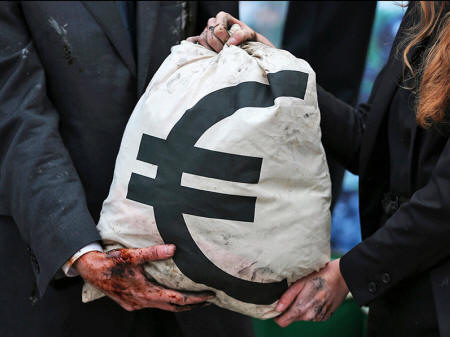|
November 26, 2015
from
WolfStreet Website
Blood on the Bourse
Spain is about to experience its biggest corporate insolvency ever.
Unlike Bankia and all of Spain's other bankrupt savings banks, Abengoa, a Seville-based multinational specialized in renewable energy and "environmental services," is unlikely to receive a taxpayer-funded bailout - at least not just yet, not with general elections looming in less than a month's time.
Following yesterday's announcement that the company was seeking preliminary protection from creditors, Abengoa's bonds and shares went into freefall. It was a financial bloodbath. According to S&P Capital IQ LCD, its euro-denominated 8.5% notes due 2016 plunged 38.5 points to 25.5 cents on the euro, after having been up at 93 cents on the euro only two weeks ago.
The U.S. dollar-denominated paper also suffered huge price declines in block trades.
The engineering "Finance" unit's 8.875% notes due 2017 plummeted 42.5 points, to 16.5 cents on the dollar, while the pari passu 7.75% notes due 2020 plunged from 45 before the announcement to 15 cents on the dollar.
On Spain's benchmark stock index, the IBEX 35, Abengoa's B shares - valued just over a year ago at €4 - plunged as much as 69% to €0.28 before staging a brief dead-cat bounce. At the time of writing today, the B shares have fallen a further 25%.
With total debt of nearly $9 billion and growing, Abengoa yesterday filed under article 5 bis of the Spanish insolvency law.
As WOLF STREET reported a few months ago, the company was undone by its mad rush for growth at any cost as well as its unconstrained embrace of the dark arts of financialization.
Even if Abengoa was to find a last-minute guardian-angel investor to take up some of the slack, the chances of it being able to find enough cash to service its debt pile are rice-paper thin.
The company's losses, slumping shares, and difficulty accessing financing could generate "significant doubts" over its ability to keep operating, warned its chief auditor, Deloitte.
That is putting it mildly. With its primary overseas creditors refusing to refinance its debt and its bonds and shares losing most of their value, the only two things that can save the company now is a massive haircut or a bailout.
And with do-or-die general elections scheduled for December 20th - elections that the governing People's Party is contesting on the basis of its sound economic management and Spain's Lazarus-like return to robust economic health - a bailout is out of the question, at least until after the elections.
And by then it could be too late.
Zero Risk Management
Abengoa's demise could have serious repercussions for the financial sector, both in Spain and abroad.
Most of Abengoa's debt is owed to Spanish banks, primarily Santander, though other banks exposed to the company include,
This is particularly bad news for Spain's banks, which are owed €4.3 billion. About 20% is unsecured and will be wiped out first.
Spain's biggest bank, Santander, is at the top of the pile with €1.56 billion of exposure, followed by,
The list goes on and includes many of Spain's bailed out saving banks.
In fact, the only entity not to have exposure to Abengoa is Spain's number-two bank, BBVA. Most of the banks have made no provisions whatsoever to hedge their exposure.
If Abengoa is unable to reach an agreement with its creditors in the next four months, the banks will have to begin making their first bad-debt provisions at the end of the first quarter 2016.
This could be easier said than done for a financial sector that has just been singled out by the European Banking Association (EBA) as Europe's most undercapitalized.
Victim of Its Own Success
Given its own indirect financial exposure to Abengoa - through ICO and Bankia - Spain's (unconsulted) taxpayers have at least €740 million invested in the company.
About 7,000 Spanish jobs are on the line, most of them in Andalusia where the unemployment rate is already 31%, and youth unemployment 57%. It's assumed that the Spanish government will move hell and high water to prevent a total collapse of the company.
In October the central government joined forces with Andalusia's regional administration and the former King of Spain, Juan Carlos I, who continues to serve as an 'exemplary' account manager for Spain Inc, to pressure Spain's banks into making one last-ditch effort to save the company.
An investor was duly found - the Gonvarri Corporación Financiera, a subsidiary of the Basque industrial group Gestamp - but Abengoa's international creditors refused to sign off on the deal.
Ironically, it is Abengoa's ability to repackage and spread its debt around the world that could well be its ultimate undoing.
As a result, any eventual haircut will need the approval of myriad financial institutions, many of whom are far less concerned about or affected by the potential blowback of the company's collapse for Spain's government or financial system.
And if there's no haircut, it leaves only one option on the table:
Just don't tell Spanish voters - at least not for the next three and a half weeks...
|


